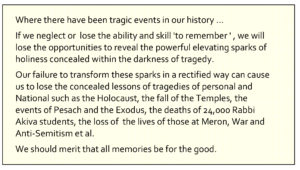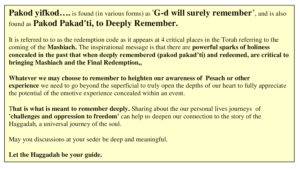
28 May Parshas Beha’alotcha; Remember When (includes insights in Recovery) rev23
 Parshas Beha’alotcha – Remember When
Parshas Beha’alotcha – Remember When
An Approach to Recovery Through the Wisdom of Kabbalah, Chassidut and the 12 Steps of Recovery
Torah and 12 Steps; Change, Gratitude, Relapse, Trust
Inspired by the teachings of Harav Yitzchak Ginsburgh and Rabbi Moshe Genuth
Change is difficult.
There is a saying that if a person can change one character trait,
it is as if he has learned all of Torah. (Rav Yisroel Salanter).
Perhaps the most challenging questions one is faced with in life are those issues regarding change and the unknown.
When approaching change, we might find it useful to ourselves asking the following ;
1) ‘What am a leaving behind (or giving up) if I make changes in my life? ’
There is a process involved in change including; surrendering to G-d (a Higher Power, a Power Greater than Oneself). This change requires a demonstration of acceptance, surrender and humility.
2) ‘What will happen next once I have made a decision and taken actioin to make change?
As a result of this or any other change, there will be a void created, and accordingly a need to fill that void in an appropriate way.
We can find the resolve to both these concerns in our trust (bitachon), and faith (emunah) in Higher Power, G-d. Both of these questions above require one to ‘stand in the question ’, also referred to as ‘holding a paradox or holding/carrying opposing ideas’. This is the challenge of the potential of our free will to choose. The gift of free will is an opportunity that became realized by the Jewish Nation when G-d redeemed us from Egypt. The first and most critical choice the Jews-to-be-a –Nation needed was to choose to go out of Mitzrayim with Moshe, or stay in the deficient state of Egypt they came to know.
Having witnessed the many miracles of G-d through the 10 plagues, the Jews-to-be-a-liberated to become a Nation needed to ask the question ‘do I have the trust in G-d and Moshe to decide to pack up and go out of Egypt (ie to leave the deficient state of oppression which I have come to know as ‘home’) to be a part of a Great Nation’? Surprisingly, even after the awesome presence of G-d in Egypt, only a fraction, 1/5th – (20%) of all the enslaved Jews left Egypt with Moses. Only 2-3 million left Egypt while some 13-15 million stayed behind in Egypt. They did not follow Moses, and perished. The people that stayed behind had became accustomed and familiar with life as they knew it as slaves in Egypt. They knew no other life and resisted any change. This is the same as the resistant ways of change of an addict or any other person who is hardened in his ways. When a person becomes so hardened to a way of life, they are unable to see the possibility of change to something better.
A life of redemption is a life of joy.
Each time a person makes a choice, one should ask themselves
‘is this bringing me toward or away from my relationship with G-d’?
Gratitude and Trust-
In this weeks Parshas Beha‘alotcha, we see the circumstance of a lack of gratitude and trust. The Jewish Nation had been redeemed from slavery of Mitzrayim (Egypt). The Nation saw the many miracles; the 10 plagues, the parting of the Sea, the receiving of the Torah at Sinai… we, the Jewish Nation have never again been at such an elevated state, yet in Parshas Beha’alotcha we see the newly redeemed Jews chose to complain of the lose of an idealized existence. They chose to remember their enslavement as ‘the good ‘ol days’ when they were slaves in Egypt. As we read the verse from the parsha, we should try to keep in mind those times we may have idealized or glorified our own personal circumstances when reminiscing the past. This deficient way of thinking is borne out of lack of trust , lack of faith and a stubbornness (might and arrogance) to resist change can be remedied by a program of recovery based on the principles of Torah,.
Remember when’s…
We are commanded to ‘remember the exile from Egypt’. We are to reflect on the role of God, a Higher Power… His miracles and the journey of freedom. This ‘reflective philosophy’ is also held by practitioners of the 12 Steps of Recovery. When we (as is also done in the process of recovery of the 12 Step Programs) ‘remember when’ in a positive way, we can remember when we were once slaves in Egypt… and G-d redeemed us. This is a ‘remember when’ that is supported with the clarity of Torah and commentaries. This is a ‘remember when’ of great transformation of incividuals and a Nation. The impure and negatively impacting ‘remember when(s)’ may come about as a result of the influences of manipulation or embellishment of truth thus lacking clarity. This is where ‘self will or ego’ may compromise or create a counterfeit reality. Where one has lacked clarity in or of the past events , the memory of people places and things will lack clarity. This was demonstrated with those who had been freed from the oppression of Egypt yet soon complained in the journey through the desert;
Verse 4: The collection [of nationalities] among them began to have strong cravings, and Bnei Yisroel turned and began to weep; and they said “Who will feed us meat?
Verse 5: We remember the fish which we ate in Egypt freely; the cucumbers, watermelons, leeks, onions and garlic.
Verse 6: Now our bodies are withered, there is nothing at all, but the manna before our eyes.”
Verse 7: The manna was like coriander seed and it is similar to the appearance of crystal.
Verse 8: The people [merely] strolled about and they gathered it and they ground it with a millstone or crushed it in mortars and cooked it in pots and made cakes out of it. Its taste was like the taste of cake kneaded with oil.
Verse 9: When the dew would descend on the camp, at night, the manna would descend on it.
In these verses, the Jews ‘remember when’ seems to be about the food in Egypt (food as the focus of their desire); the cucumbers, watermelons, leeks, onions and garlic, and the unlikely claim as slaves they had the luxury of fish meat if ever. The Ramban shares that they are remembering the ‘good old days’ of the free food they got …as slaves. Ironically, the food source they received at this time was the Manna from G-d in Heaven. It was free and could miraculously taste like anything one desired. It little or no preparation as desired. All the produce of Egypt they described however is produce that grows in the ground. It is peasants’ food. To harvest root vegetables one must bend over to arduously extract it from the ground, and as for melons, they are large, heavy, and difficult to handle. In either case, what they are ‘fondly’ recalling is food that took their own back breaking work to harvest and remembering the experience as something that was desirable. They are remembering the enslaved life of hardship as something that was good. This is the stinkin’- thinkin’ that identifies the beginning of their falling or relapse (and relapse in general) as you will be seen in the upcoming verses. It is the same kind of glorifying rationalized thinking that cause people to make the same mistakes over and again.


The glorification of an inappropriately lived past is a road to relapse…
All too often our desires and ego cause us to rationalize our past detrimental circumstances as being something that was, or is acceptable or appropriate. Real change is difficult, and the path to good or complete change is righteous living through the process of building of trust and faith in and with G-d. This is an evolutionary process that leads to transformation.
Smile… and the world smiles with you,
Cry… and I’ll give you something to cry about…
Having been redeemed from the slavery in Egypt, having had the miracles of the Red Sea and the Revalation at Sinai , G-d heard from them the complaints and their desire for meat as ungrateful and responded to them;
Verse 18: You shall say to the people, prepare yourselves for the morrow and you shall eat meat, for you have cried in the ears of Ad-noy, saying: “Who will feed us meat; we had it good in Egypt”; [now] Ad-noy gives you meat and you shall eat.
Verse 19: Not for one day will you be eating and not for two days; not for five days, not for ten days, and not for twenty days.
Verse 20: But rather for a month of days, until it comes out of your nostrils and it will be repulsive to you; [this is] because you have rejected Ad-noy Who is among you, and you have cried before Him, saying: “Why have we come out from Egypt”
Verse 31: From Ad-noy there gusted a wind and He caused quail to fly from the sea and spread them over the camp, about a day’s journey from this side and about a day’s journey from that side, around the camp, and about two amos above the ground’s surface.
Verse 32: The people arose all of that day, the entire night and the entire next day, and they gathered the quail. He who gathered the least amount, gathered ten heaps and they spread them for themselves around the camp.
Verse 33: The meat was still between their teeth before it was [even] finished, when the wrath of Ad-noy was incited upon the people, and Ad-noy smote the people an enormous blow.
Verse 34: He called the name of that place Kivros Hataavoh, for it was there that they buried the people who had these cravings.
Relapse in addiction …
The previous verses is a classic example of ‘be careful what you wish for’. Relapse in addiction is like the glorified reminiscing of Egypt by those Jews (ungrateful for their newfound freedom ) as those who lacked gratitude as they journeyed in the desert. What they recalled of their life of oppression and enslavement in Egypt lacked clarity. What they chose to remember was pardoxically counterfiet of how good things were during their oppression as slaves in Egypt. The consequence of the tainted memories for them as it is for many addicts (and others), is that ‘counterfeit or false memories’ may lead to relapse on the path to change. And as it was in Bamidbar (the dessert), the return to the memory of the counterfiet memories of past oppresion can and was fatal. Those who craved what they had come to believe they missed in their enslaved state in Egypt, those who had not been satiated by the miraculous Manna food source, when participating in the eating of the meat to finally fill their desire, died.
In order to have Trust and Faith , one must be on the continuous path to
give and receive in a working relationship with a Higher Power, G-d. This requires the trait of Humility.
The changes we make on the continuous path of righteous
living depends on our Humility, our Trust and Faith in G-d.
Leib Getzel (Lawrence) Lax
Addictions and Counseling (Honours)
www.lawrencelax.com